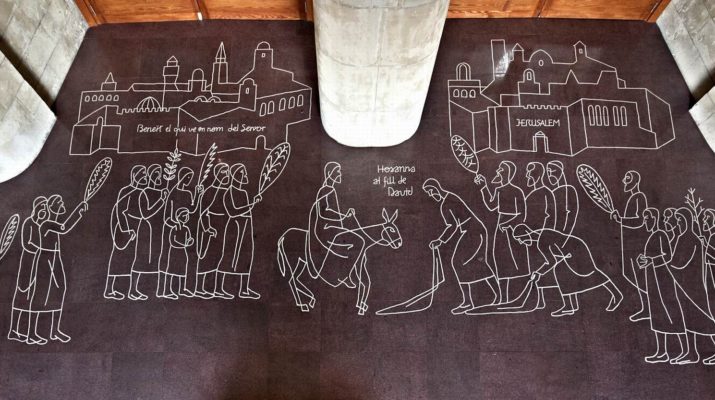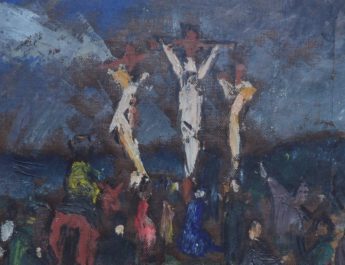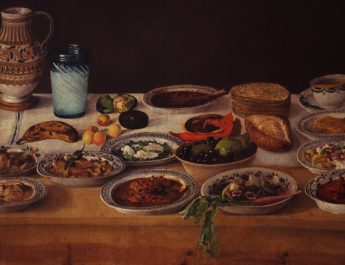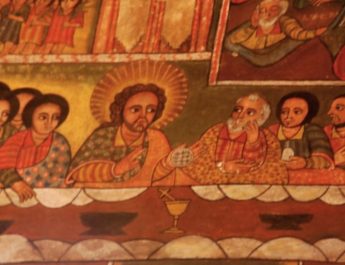John 12:12-16
Palm Sunday B18
12 The next day the great crowd that had come to the festivalA heardB that JesusC was coming to Jerusalem.D
A “festival” = heorte. This is a holiday or feast.
B “heard” = akouo. This is hear or listen, but it also means to understand by hearing. This is where the word “acoustics” comes from.
C “Jesus” = Iesous. From Hebrew Yehoshua (Joshua, the Lord is salvation); {from YHVH (proper name of the God of Israel; the self-existent and eternal one); {from havah (to become) or from hayah (to come to pass, become, be)} + yasha (to deliver, defend, help, preserve, rescue; properly, to be open, wide or free, which implies being safe. So, in a causative sense, this is to free someone)}. This is Jesus or Joshua in Greek – the Lord saves or the Lord is salvation.
D “Jerusalem” = Hierosoluma. From Hebrew yerushalaim (probably foundation of peace); {from yarah (to throw, shoot, be stunned; to flow as water so figuratively to instruct or teach) + shalem (to make amends, to be complete or sound)}. This is Jerusalem, dwelling of peace.
13 So they took branchesE of palm treesF and went out to meetG him, shouting,H
E “branches” = baion. 1x in NT. Perhaps from basis (a pace, base, step, foot); from baino (to walk, go). This is a palm branch or twig.
F “palm trees” = phoinix. 2x in NT. This is a palm tree or date palm. It is related to the word “phoenix.”
G “meet” = hupantesis. 3x in NT. From hupantao (to encounter someone or to go to meet them); {from hupo (by, under, about, subordinate to) + antao (to meet with personally) OR from hupo (see above) + anti (opposite, instead of, against)}. This is meeting or encounter.
H “shouting” = kraugazo. 9x in NT. From krauge (a very emotional shout or cry generally or clamor against someone else; a cry of alarm, trouble, or grief); from krazo (to cry out, scream, shriek; onomatopoeia for the sound of a raven’s call; figuratively, this is means crying out urgently without intelligible words to express something that is deeply felt). This is to cry, shout, clamor. It is a screaming or shrieking that is often impossible to understand exact words in. It is sound expressing feeling/urgency. Properly, this refers to loud animal sounds.
“Hosanna!I
Blessed isJ the one who comes in the nameK of the LordL—
the KingM of Israel!”N
I “Hosanna” = hosanna. Related to “Jesus” in v12. 6x in NT. From Hebrew yasha (see note C above) + na (particle used for requests or for urging; can be we pray, now, I ask you, oh). This is Hosanna – save, we pray. It started as a call for help, but later became a cry of happiness (anticipating the help coming). It can be save now, please save, or oh, save.
J “blessed is” = eulogeo. From eu (good, well, well done, rightly) + logos (word, statement, speech, analogy; a word that carries an idea or expresses a thought, a saying; a person with a message or reasoning laid out in words; by implication, a topic, line of reasoning, or a motive; can be used for a divine utterance or as Word – Christ); {from lego (to speak, tell, mention)}. Properly, this is speaking well of – speaking so that the other is benefited. It can mean praise, bless, thank, or call for a blessing. This is where “eulogy” comes from.
K “name” = onoma. May be from ginosko (know, recognize, learn from firsthand experience). This is a name, authority, cause, character, fame, reputation. The name was thought to include something of the essence of the person so it was not thought to be separate from the person.
L “Lord” = kurios. From kuros (authority, supremacy). This is a respectful address meaning master or sir. It refers to one who has control or power greater than one’s own. So, it was also applied to God and Jesus as Master or Lord.
M “King” = basileus. Perhaps related to “branches” in v13. Probably from basis (see note E above). This is king, emperor, or sovereign.
N “Israel” = Israel. From Hebrew Yisrael (God strives or one who strives with God; new name for Jacob and for his offspring); {from sarah (to persist, exert oneself, contend, persevere, wrestle, prevail) + el (God or god)}. This is Israel the people and the land.
14 Jesus foundO a young donkeyP and satQ on it; as it is written:R
O “found” = heurisko. This is to find, learn, or obtain. It is to discover something, which generally implies a period of searching for it. This is to find in a literal or figurative sense. This is where the word “heuristic” comes from.
P “young donkey” = onarion. 1x in NT. From onos (donkey). This is the diminutive form – little donkey.
Q “sat” = kathizo. From kathezomai (to sit down, be seated); {from kata (down, against, according to, among) + hezomai (to sit); {from aphedron (a seat, a base)}}. This is to sit, set, appoint, stay, rest.
R “written” = grapho. This is to write or describe. It is where the word “graphic” comes from.
15 “Do not be afraid,S daughter of Zion.T
Look,U your king is coming,
sittingV on a donkey’sW colt!”X
S “be afraid” = phobeo. From phobos (panic flight, fear, fear being caused, terror, alarm, that which causes fear, reverence, respect); from phebomai (to flee, withdraw, be put to flight). This is also to put to flight, terrify, frighten, dread, reverence, to withdraw or avoid. It is sometimes used in a positive sense to mean the fear of the Lord, echoing Old Testament language. More commonly, it is fear of following God’s path. This is where the word phobia comes from.
T “Zion” = Sion. 7x in NT. From Hebrew tsiyyon (Zion – a mountain in Jerusalem as well as another name for Jerusalem itself or the people); related to tsyiyyun (signpost, monument); from tsavah (to charge someone, to command, order); from the same as tsiyyah (dryness drought); from a root meaning parched as desert, dry land. This is Zion – the mountain in Jerusalem, the city, or its people. Also used figuratively to refer to the church.
U “look” = idou. From eido (to be aware, see, know, remember, appreciate). This is see! Lo! Behold! Look! Used to express surprise and or draw attention to the statement.
V “sitting” = kathemai. From kata (down, against, throughout, among) + hemai (to sit). This is to sit, be enthroned, or reside.
W “donkey’s” = onos. Related to “young donkey” in v14. 5x in NT. See note P above.
X “colt” = polos. 12x in NT– all in Jesus’s Palm Sunday entry into Jerusalem. This is foal, colt, or young donkey.
16 His disciplesY did not understandZ these things at first; but when Jesus was glorified,AA then they rememberedBB that these things had been written of him and had been doneCC to him.
Y “disciples” = mathetes. From matheteuo (to make a disciple of); from manthano (to learn key facts, gain knowledge from experience; generally implies reflection as part of the learning process); from math– (thinking things through). This is a disciple, learner, or student. It is where we get “mathematics” from.
Z “understand” = ginosko. Perhaps related to “name” in v13. See note K above.
AA “glorified” = doxazo. From doxa (glory, opinion, praise, honor, renown; particularly used as a quality of God or manifestation of God – splendor); from dokeo (to have an opinion, seem, appear, suppose; a personal judgment; to think); from dokos (opinion). This is to render or hold something as glorious, to glorify, honor, magnify, or celebrate. This is ascribing weight to something by recognizing its true value or essence.
BB “remembered” = mimnesko. From mnaomai (to remember; by implication give reward or consequence); perhaps from meno (to stay, abide, wait, endure). This is to remind or remember. It is memory through an active, intentional process or being mindful of. It is not incidentally or accidentally remembering.
CC “done” = poieo. This is to make, do, act, construct, abide, or cause.
Image credit: “Jesus’s Entry into Jerusalem” by Domènec Fita at the Sagrada Familia Basilica in Barcelona, Spain.




